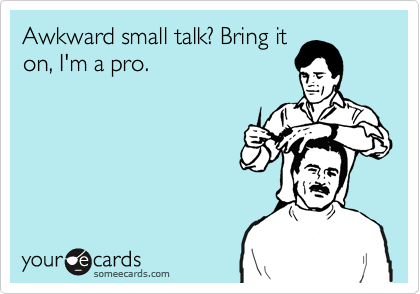Sometimes, writers drink. Or rather: sometimes, writers drink together. And in these gatherings, out of habit, we talk about writing. Instead of asking, “What did you do last weekend?” we ask, “What have you been reading?” I hate this latter question for the same reason I hate the former—because as soon as it emerges from the person’s mouth, I know that I will not be able to think of an answer, and more often than not, the answer I settle on will be, “Nothing much.”
Writerly small talk is no less terrible than all other kinds of small talk. I expect that the coffee table or cocktail conversations of botanists, estheticians, and Sunday school teachers all have their own fallback question, their own version of a polite follow-up after the “How are you’s” have been exchanged.
The problem, or one of the problems, I think, is that the question of “What have you been reading,” and its brethren, is simultaneously open-ended and a dead-end. The responder has to deal with the burden of coming up with an answer, going back through his or her memory to draw up a title, and, if the person is interested in the conversation going further, making sure to pick an interesting or popular title. The asker, on the other hand, understands that regardless of what book the responder offers up, there are few avenues through which they can go. Most likely, the asker will not have heard of the title. If they have heard of the title, they most likely will not have read it. If they have read it, they most likely will not have much of an opinion. If they have an opinion, well who cares about your opinion, this is small talk, after all!
I’m oversimplifying and overexaggerating. The question of “What have you been reading?” will continue to be asked, just as every undergraduate classroom discussion will begin with, “Um” and end with, “So… yeah.” Just as every student will continue to describe a text as “interesting.” Word patterns that exist simply to stall, or to bookend, will never die out—across generations, across cultures, we all need something to fill the silence, both in the room, and in the sudden blankness of our minds.
But the problem is that in stalling for time, you are merely tossing the conversational hot potato at your colleague, acquaintance, workshopmate. So might I suggest, the next time you cannot think of anything to say, that you consider at least making your question multiple choice? Or even better, either/or?
“Did you leave your house this weekend, or did you lie around doing nothing?”
“That novel you’re working on, while I don’t care to know how it’s going, I would be interested to know, would you rather it sell a million copies, become a cult phenomenon, or be taught in classrooms for generations?”
“Have you read anything interesting lately, or would you rather I ask you a different question entirely?”




